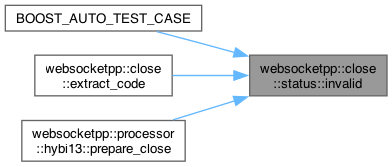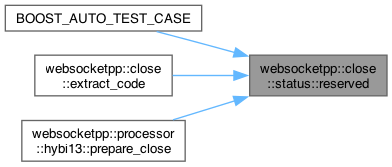Loading...
Searching...
No Matches
A package of types and methods for manipulating WebSocket close status'.
Typedefs | |
| typedef uint16_t | value |
| The type of a close code value. | |
Functions | |
| bool | reserved (value code) |
| Test whether a close code is in a reserved range. | |
| bool | invalid (value code) |
| Test whether a close code is invalid on the wire. | |
| bool | terminal (value code) |
| Determine if the code represents an unrecoverable error. | |
| std::string | get_string (value code) |
| Return a human readable interpretation of a WebSocket close code. | |
Typedef Documentation
◆ value
Function Documentation
◆ get_string()
|
inline |
See https://tools.ietf.org/html/rfc6455#section-7.4 for more details.
- Since
- 0.3.0
- Parameters
-
[in] code The code to look up.
- Returns
- A human readable interpretation of the code.
Definition at line 227 of file close.hpp.
227 {
228 switch (code) {
229 case normal:
230 return "Normal close";
231 case going_away:
232 return "Going away";
233 case protocol_error:
234 return "Protocol error";
235 case unsupported_data:
236 return "Unsupported data";
237 case no_status:
238 return "No status set";
239 case abnormal_close:
240 return "Abnormal close";
241 case invalid_payload:
242 return "Invalid payload";
243 case policy_violation:
244 return "Policy violoation";
245 case message_too_big:
246 return "Message too big";
247 case extension_required:
248 return "Extension required";
249 case internal_endpoint_error:
250 return "Internal endpoint error";
251 case tls_handshake:
252 return "TLS handshake failure";
253 case subprotocol_error:
254 return "Generic subprotocol error";
255 case invalid_subprotocol_data:
256 return "Invalid subprotocol data";
257 default:
258 return "Unknown";
259 }
260 }
Here is the caller graph for this function:

◆ invalid()
|
inline |
- Parameters
-
[in] code The code to test
- Returns
- Whether or not code is invalid on the wire
Definition at line 194 of file close.hpp.
194 {
195 return (code <= invalid_low || code >= invalid_high ||
196 code == no_status || code == abnormal_close ||
197 code == tls_handshake);
198 }
Here is the caller graph for this function:

◆ reserved()
|
inline |
◆ terminal()
|
inline |
There is a class of errors for which once they are discovered normal WebSocket functionality can no longer occur. This function determines if a given code is one of these values. This information is used to determine if the system has the capability of waiting for a close acknowledgement or if it should drop the TCP connection immediately after sending its close frame.
- Parameters
-
[in] code The value to test.
- Returns
- True if the code represents an unrecoverable error
Definition at line 212 of file close.hpp.
212 {
213 return (code == protocol_error || code == invalid_payload ||
214 code == policy_violation || code == message_too_big ||
215 code == internal_endpoint_error);
216 }
Here is the caller graph for this function:

